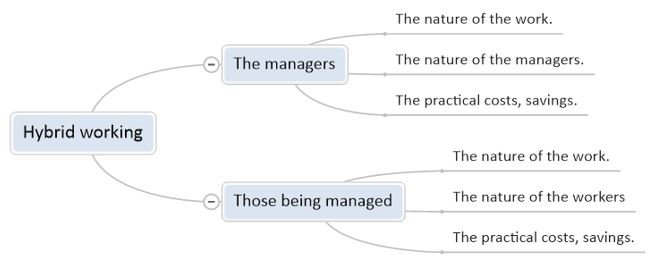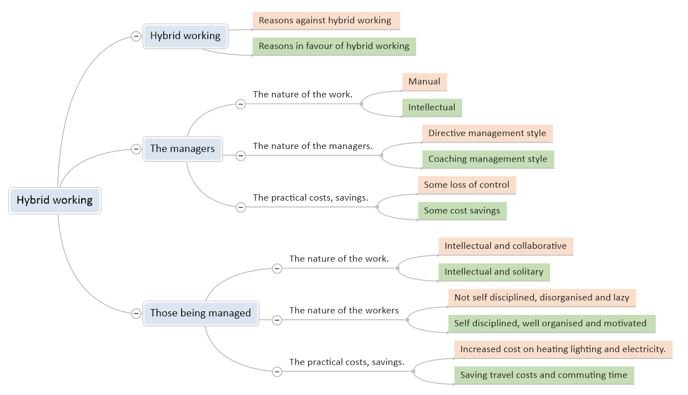How to Manage Hybrid Working
Is Hybrid Working Right for Us?
For many people, since the advent of the Covid crisis, lockdowns and social distancing, hybrid working has become part of the work landscape.
Hybrid working raises many new questions for leaders, managers and workers, which amount to a single question, "How can we best manage hybrid working?"
The question is complex, because it is split into two parts - the Managers and those being managed - with each part containing three subsets:
- The nature of the work.
- The nature of the People.
- The practical costs and savings.

Let us examine each in turn.
Hybrid Working from the perspective of managers.
Nature of the work.
From the managers point of view, the nature of the work is the primary factor. If the work is manual, and requires that the workers be physically present, then hybrid working is unthinkable.
If the work is intellectual, and can be done on computers, then the option of hybrid working becomes viable, but only if certain other conditions are met.
Nature of the managers.
Some managers take a directive approach to management: they instruct people what to do, and how to do it. They do not give people much freedom to choose what they do.
Those managers who, (for whatever reason), have adopted a directive approach to management, do NOT feel good about Hybrid working, and want to instigate many controls and performance management protocols, which track the work rates of workers. This causes upset and annoyance because it implies a lack of trust on behalf of management, (which may or may not be justified).
On the other hand, many managers have a "Coaching style" of management which allows workers more latitude in deciding how they use their time and effort. Such managers feel relaxed about hybrid working and trust people to use their best judgement in how they work. This relaxed coaching style of management can work well, or not, depending on the true nature of the workers.
Practical costs and savings for the business.
If fewer people are physically attending the place of work, that has many implications for costs and savings. Fewer people means less space is needed. It means less electricity, fewer ad hoc conversations in corridors, and fewer cars in the car park.
So, IN THEORY the organisation makes savings, which IN PRACTICE may be wiped out by the potential negative consequences of hybrid working.
Hybrid working from the perspective of the workers.
The nature of the work.
If the work is such that it can conceivably be done at home, then the next question is, "Can the work be done as well, or better at home, or will doing the work at home inevitably lead to a drop in the quality or quantity of work completed?"
If the work is intellectual AND solitary, then it makes no difference whether the worker is at home, on a train, or in an office.
Provided the worker can concentrate, then the work can be done home-alone.
But, if the work is intellectual and collaborative, ie it requires group think; brain storming; and creative problem solving; then the work is best done in the office, alongside other colleagues.
Intellectual, collaborative work is more effective when people get together in person, because humans are social animals.
Mostly, we do our best intellectual work when we are in small groups of between two and four people.
The nature of the workers.
Some people are self-disciplined, well-organised and highly motivated. Others lack self-discipline, they are disorganised, and not motivated. (Sadly, some people are lazy).
It is obvious that hybrid working is applicable to the first group, but NOT to the second.
The problems arise whenever self-disciplined, organised and motivated workers are told that they are not trusted to work at home.
And problems also arise whenever un-disciplined, disorganised, or lazy workers are told they ARE trusted to work at home.
Practical costs and savings for workers.
When workers stay home, they save on travel costs and commuting time, which is an enormous attraction for many would-be hybrid workers.
On the other hand, hybrid workers increase their own heating and electricity bills which, with energy costs being now at an all-time high, is an enormous disincentive for hybrid workers.
In addition, there are many built-in distractions at home: Pets, family members, drop in callers, housework and errands. It may be convenient to be able to do these home-life activities in work time, and make up the time later, but it is NOT the optimum work state.
The solution to the Hybrid working puzzle.
There is no single-line answer to the many questions posed by hybrid working.
Each organisation must make its decision after deliberating carefully about the six major sets we have discussed in this blog.
The right answer in one organisation, would be the wrong answer in the one next door.
Is Hybrid working right for us?
Use this framework as a guide to your discussions with colleagues as to whether or not, hybrid working is right for you.

Definition: hybrid working
Hybrid working is a way of working that mixes time in the office with time at home or another place. People follow an agreed split, use online tools to link up, and leaders set clear rules and judge results not hours. If any part is missing, the set-up is no longer hybrid working.
Show CG4D Definition
- Combines on-site and remote work in one role
- Follows a planned schedule or task split between locations
- Relies on digital tools for real-time communication and output
- Depends on trust and result-based management
Article Summary
Hybrid working succeeds when leaders weigh job type, staff traits and costs, place group work in the office, let focused people work from anywhere, and measure results not desk time.
Frequently Asked Questions
Here are some questions that frequently get asked about this topic during our training sessions.
Which types of jobs suit hybrid working best?
How do I judge if a worker fits remote days in a hybrid setup?
How can hybrid team leadership build trust without tight tracking?
What are the cost pros and cons of hybrid working for a business?
Why is group problem solving often better in the office?
What extra costs might workers face when they stay home?
Is there one best hybrid working policy for every organisation?
Thought of something that's not been answered?
Did You Know: Key Statistics
The 2024 Microsoft Work Trend Index finds that 87% of UK office workers choose to work remotely at least one day per week, making hybrid the main model. Office for National Statistics data for Jan–Mar 2024 shows 28% of UK workers mainly work from home, double the share seen in early 2020.Blogs by Email
Do you want to receive an email whenever we post a new blog? The blogs contain article 5-10 minutes long - ideal for reading during your coffee break!
Further Reading in Leadership and Management
-
The Seven Aims of Leadership Training
Seven leadership training objectives give managers clear purpose, good communication, assertive talk and coaching skill so teams work better and staff stay.
Read Article > -
The Golden Rule of Effective Leadership and Management
Learn the golden rule of rational leadership: act with reason, not impulse. Set clear purpose, test logic and watch team trust, productivity and retention rise.
Read Article > -
Management Communication Styles
Learn how four management communication styles-winner, dreamer, bodger and loser-shape team performance and get tips to build a winner mentality at work.
Read Article > -
What is the Skill Will Matrix?
Discover how the Skill Will Matrix helps managers match coaching, support, delegation or supervision to worker skill and motivation, and refine hiring decisions
Read Article > -
Good leadership and management is just common sense isn't it?
Learn how common sense drives leadership and management success. Communicate clear goals, lead by example, foster team harmony and apply justice to boostresults
Read Article >
Looking for Leadership and Management Training?
If you're looking to develop your Leadership and Management Skills, you may find this Leadership and Management Training Course beneficial:
Open Training Course Pricing and Availability
Next Open Course Starts in 7 days, Leeds City, places available






